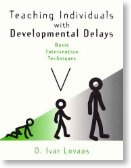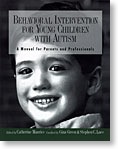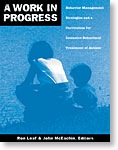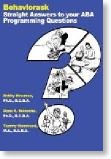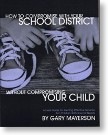Why the Canadian Government Can’t Run a Hot Dog Stand at a Baseball Game!
After a bunch of lawsuits, a public relations embarrassment that lead to the creation of a national website in the early 2000s, finally with the help of a turncoat MP who sold out the entire autism community while his son received science-based treatment, the Canadian government has announced the creation of a academic chair in autism. What is the expertise of the person who is going to fill the chair? Is it someone who is on the cutting edge of treatment research? Is it a researcher who is pushing the envelope when it comes to adding to the body of knowledge in the one area that has the most data, applied behavior analysis? No.
The person whose expertise is supposedly promising that it merits an academic chair is Jonathan Weiss, Ph.D, an assistant professor at York University. The website indicates the following as areas of specialty for Weiss:
- Families in distress,
- Asperger's and "cognitive therapy"
- How to teach graduate students this area of expertise,
- Caregiver's perspectives when failure has occurred and the kid winds up in the hospital.
Why should we be surprised? This chair is supported by The Canadian Institutes of Health Research (CIHR). This is the Government of Canada's health research investment agency and the same folks who fought against families in the landmark Auton Case at the Supreme Court of Canada. The CIHR claims that it’s mission is to “create new scientific knowledge and to enable its translation into improved health, more effective health services and products, and a strengthened Canadian health care system.”
In fact, based on this choice for this academic Chair, one could argue that the CIHR’s true mission appears to be to make sure that academics in Canada don’t actually come up with innovative treatments because then the government would have to pay for them. Instead, they agree to have researchers who are not going to be innovative for children who really need it, but rather, study us, the parents, because that’s far easier.
Autism & Wandering: Common Sense Solutions
t may be more accurate to say is an “escape artist,” as long as the child is in your care you can create a safe environment with locks on windows and doors and alarms that sound any time someone opens a window or door. Thousands of parents have created the equivalent of Fort Knox in their home and have trained everyone in the child’s orbit to ensure that the child does not leave. Parents are generally vigilant and the child is safe. Some parents have even elected to have a tracking system on their child as a last resort.The issue that keeps almost all of us awake is when our child is in the care of the school. Unfortunately, most children with autism in typical classrooms do not have locked, fenced school yards and enough supervision to keep these integrated children safe. The schools are very quick to defend their purportedly safe environments even when a parent sees all the gaping holes in security around the school. If the parent gets too pushy, the school bureaucracy often defends their lackadaisical stance and becomes aggressive with parents, possibly invoking the nuclear option by saying: “if this school is not secure enough for your little Johnny, then perhaps we need to reevaluate whether your child should be integrated.” Since so many parents are fighting for mainstreaming, this ends the discussion immediately and is one of the major motivations to get “lawyered up.” Some parents just give up and accept segregation due to the safety concerns.
Since the parent cannot rely on the school to protect the physical safety or their child, the next fight is to require one-on-one supervision in the school yard. The school then typically deploys the “buddy” system where they get older children to “supervise” the autistic child even in elementary school!
I came across an article by Amy Daniels, Ph.D., an Autism Speaks health policy researcher, who gives an in-depth analysis of autism and wandering. At the end of the article she says: “The time to develop solutions is now.” I couldn’t agree with her more.
Here’s my solution. Every school yard needs to be 100% secured with high fences and no way to get in or out from the school compound. All exits from the school need to be monitored every day, all day.
With the number of children afflicted with autism growing, every school will have to be secured. Not only will this help children with autism, it will also help all children remain safe and give every parent a better night’s sleep.
Autism Treatment Insurance in Washington State Makes Huge Progress
Autism advocates in Washington State are not sitting still and waiting for their state legislature to pass the law. In a class action suit, Washington State public employees have just won a big legal victory. Now all children with autism whose parents are insured through the Washington State employee healthcare plan (Uniform Medical Plan) are covered for autism treatment. These children are not the only group to be covered. In addition, Washington State’s Group Health Cooperative is going to be covering another 800 autism families! I’d say that the parent advocates in Washington State are having a very productive summer!
How To Skate Around Discrimination
I can’t believe that I’m still reading about the same issue twenty years later! In this article, the parents were savvy. They quickly went over the head of the luddite who has no concept of the term “accommodation” and called the media. In this case, the media did their job and put pressure on the mayor, who immediately realized that this flawed policy must be changed. Kudos to those smart parents who leveraged the media to change a policy that is going to help every child with special needs who follows. I’ve written in the past on how to address this problem in a non-confrontational manner; however, since this pattern keeps rhyming, it is worth revisiting the issue.
Based on the lessons learned from this news story, here are the following steps you may consider taking when you sniff a potential problem when integrating your child: first, approach the person in charge of registration and with a very energetic, positive demeanor say that you’d love to have your child learn how to skate (swim, dance or whatever); however, due to your child’s special needs, you have a shadow aide, or helper, to provide free of charge to the class to support your child. You may want to add that this person knows your child quite well and will only jump in when your child has a problem understanding the directions given by the instructor.
One of two things will happen: the manager will say yes, or no.
If you are given permission, congratulations! If the manager is amenable (and you feel comfortable), then you may add that it would be less stigmatizing for the child if the helper could wear a T-shirt with the name of the rink on it, and thereby keep the children and parents guessing regarding who this second adult is in class. Your child’s shadow will simply look like a regular volunteer, not necessarily there for your child.
If the manager declines, then it is time for step two: phone your local paper and set up an interview about how the publicly funded recreation center is discriminating against a disabled child. If the reporter is not seasoned enough to interview the mayor, you might want to suggest it. In addition, if you are lucky enough to live in a country with laws protecting your child, you may want to mention those laws to the reporter. If you want to make the rubble bounce, it may be useful to send the reporter a link to the website with those laws, and copy and paste the specific part of the law into the body of the e-mail. If you are not lucky enough to have those laws at your fingertips, another idea is to contact all the various disability groups and mention that it may be a good idea for them to contact the reporter and their politicians. The pressure put on these folks will generally be too much to handle and accommodations will be made.
Ironically, once you succeed in integrating your child and they realize that life as we know it did not end, the recreation center will celebrate its success in being so open-minded and progressive! Let them own your victory; that will help the next child in line, and that child’s parent who will have no clue that the reason it was so easy to include a shadow teacher is because of a bloody minded parent who preceded them.
Here’s to bloody-minded parents!
Finding Religion to End Run Autism Education Discrimination
What happens, though, when this is not the reality? Parents have three choices: 1) they can accept the sub-standard educational experience offered to their child and live with this depressing reality for 13 years, 2) they can fight the system, getting the lawyers to communicate in a way that makes the school do the right thing (often mortgaging their house to pay for the fight), or 3) they can place their child in private school.
Here’s where religion comes in. When shopping for a private school, it may be wise to “find religion” because your odds of finding a private school that will actually take your child increases once you add parochial schools to the mix! In addition, many religious private schools are not as expensive since they are often subsidized by members of the associated congregation. An additional benefit is that your child becomes a member of a peer group that is being taught kindness and inclusion for special needs children as part of religious teachings.
Not all religious school administrators are equally open-minded; however, you can visit a number of parochial schools until you meet a religious leader who is sufficiently pious to do the right thing. The advantage of a private school is that you are the customer and, therefore, the school has more incentive and flexibility to meet the needs of your child.
Sometimes it’s worth fighting the powers that be to make sure your child has access to the neighborhood school and, therefore, the neighborhood kids; however, sometimes the battle may be too painful, onerous or impossible to win. When the battle against intransigent public schools hits the wall, it may be time to find a welcoming religious community to provide your child with a viable alternative.
Chalk one up for the good guys!
The Internet is abuzz with the latest film on autism to come out of France. This film tips the “pomme” cart, and I say “Bravo”! The film is called: “The Wall; Psychoanalysis put to the test for autism.” It is a must watch film. I suggest you do it quickly before it’s forcibly removed from the Internet. This film has been banned by a French court, hard as that may be for a non-European audience to comprehend. The filmmaker is appealing the ruling.
Decades after the debunking of the theory that mothers cause their child’s autism, first posited by Bruno Bettleheim and embraced by the field of psychoanalysis, the insular French psychiatric community is still flogging the dead horse, with an incomprehensible disregard to the scientific advances that have been made in the rest of the world over the past 60 years. Quantitative data collection seems to be utterly irrelevant for these folks; however, with the growing popularity and reach of the Internet, parents in France have learned the basics. They’ve got us beat when it comes to food, perfume, fashion and pretty much all the finer things in life, but when it comes to autism treatment, well… not so much!
Francophone parents with autism have been historically so isolated in terms of up-to-date materials that I actually had my book, Teach Me Language, translated into French as Apprends-moi le langage, because I had so many requests from French speaking parents and speech language pathologists. I also felt that it was a tremendous injustice that children in the Francophone world had been left to the mercy of the psychoanalysts for so-called “treatment.”
I was delighted to read about a film comparing the backward, flat-earth type, psycho-analytic approach to autism intervention with the science-based approaches we’re accustomed to in the U.S. and Canada. The courage of this documentary filmmaker, Sophie Robert, is remarkable. She is standing up to the powerful French psycho-analytic community. The psychoanalysts were given almost the entire film to describe their dubious theories, and now three of them have the gall to sue the film maker because they claim that they have been misrepresented!
This is a real test for France: is the nation truly a republic with an independent judiciary that will consider science and data, or will they be intimidated by the powerful psycho-analytic traditionalists who’ve had free reign over children with autism since the term autism was coined. Filmmaker Sophie Robert has done something important for the community of parents of children with autism worldwide. We need to support her.
Intensive Behavioral Intervention for Autism: The Fight for Coverage
With recent medical innovations in both technology and treatments, new therapies have been developed and shown to benefit those children with Autistic Spectrum Disorders. One in particular is Intensive Behavioral Treatments (IBT). The legal fight for children to receive this treatment has been an ongoing one.
But first, what is IBT? IBTs include Applied Behavior Analysis (ABA), Early Intensive Behavioral Intervention (EIBI), and Intensive Behavioral Intervention (IBI). These treatments are exercises and techniques consistently applied to autistic children for several years, for 25 to 40 hours per week; children usually work with a therapist, paraprofessional, parent, or some combination of some or all of said people. However, the involvement of children’s parents throughout the process is imperative to its success.
Beginning treatment concentrates primarily on improving behaviors such as:
General social responses
Self-stimulating behaviors
Socially non-aggressive behaviors
Early on, children are rewarded for good behavior with food although this reward is very quickly faded to non-food reinforcers; all throughout therapy, bad behaviors are rewarded with neutral responses.
Intermediate treatment concentrates primarily on:
Peer interaction.
Teaching children language skills.
Advanced treatment concentrate primarily on:
Observational learning in social settings.
Proper social emotional responses and expression.
The teaching of basic education skills.
So where is the U.S. in terms of making these therapies not only more available, but mandated for insurance to cover? As of November 1, 2011, the following 29 states have passed autism insurance reform laws according to austismvote.org:
Arizona - Enacted March 21, 2008
Arkansas - Enacted March 4, 2011
California - Enacted Oct. 9, 2011
Colorado - Enacted June 2, 2009
Connecticut - Enacted June 9, 2009
Florida - Enacted May 2, 2008
Iowa - Enacted April 29, 2010
Illinois - Enacted December 13, 2008
Indiana - Enacted May 3, 2001
Kansas - Enacted April 19, 2010
Kentucky - Enacted April 14, 2010
Louisiana - Enacted July 2, 2008
Maine - Enacted April 12, 2010
Massachusetts - Enacted August 3, 2010
Missouri - Enacted June 10, 2010
Montana - Enacted May 5, 2009
Nevada - Enacted May 29, 2009
New Hampshire - Enacted July 23, 2010
New Jersey - Enacted August 13, 2009
New Mexico - Enacted April 2, 2009
New York - Enacted Nov. 1, 2011
Pennsylvania - Enacted July 9, 2008
Rhode Island - Enacted June 30, 2011
South Carolina - Enacted June 7, 2007
Texas - Enacted June 15, 2007
Vermont - Enacted May 27, 2010
Virginia - Enacted May 6, 2011
West Virginia - Enacted April 1, 2011
Wisconsin - Enacted October 19, 2009
The following 14 states, according to autismvote.org, will pursue autism insurance reform laws in 2012:
Alabama
Alaska
Delaware
Georgia
Hawaii
Maryland
Michigan
Minnesota
Nebraska
North Carolina
Ohio
Oregon
Utah
Washington
And unfortunately, the following states are not pursuing autism insurance reform laws at this time:
Idaho
Mississippi
North Dakota
Oklahoma
South Dakota
Tennessee
Washington, DC
Wyoming
The fight for coverage of IBTs is ongoing, but it has been a successful one. If things continue as they have, it is only a matter of time before all states mandate that IBTs be covered by insurance.
Allison also writes about medical malpractice on her website, Medical Malpractice Lawyers.
When the fox guards the chicken coop: A review of the film "Medicare's Orphans"
Many films about autism understandably focus in on the miserable lives of children with autism. This can sometimes be hard to watch. Medicare’s Orphans is not that kind of film.
The documentary chronicles the protracted battle to include children with autism in the Canadian health care system. It’s a strange juxtaposition to watch since in the United States, the debate lately has been about creating a health care system where everyone is covered. In contrast, Canada already has a supposed universal health care system, yet this is a story about the systematic exclusion of the one group that is shut out of health care -- children afflicted with autism.
How strange! There is a group of Canadians who don’t get health care coverage for their core health need -- autism! I guess that’s what happens when the fox guards the chicken coop, when the health care system and the government are one in the same. When government is the health insurance provider, it apparently does a lousy job of holding itself to account where a lack of autism treatment coverage is concerned.
The film describes the amazing lengths to which Canadian parents have gone to right this wrong. It shows the important successes in the courts, and the failure of the legal system at the highest level -- the Supreme Court of Canada. The filmmakers take us on a journey from coast to coast, meeting courageous parents and their children with autism. We are introduced to one parent who actually walked 286 miles in the harsh Canadian winter to Ottawa to plead his case and raise awareness of this horrendous injustice.
We are heartened by the successes of children who were fortunate enough to receive treatment because, in some cases, their parents forfeited everything to fund the treatment. In one case, we meet a woman who has rented out every room in her home to pay for autism treatment. We are also angered and disgusted by the complete failure of the Canadian health care system, which lands one child in the psychiatric unit of an Ontario hospital.
Through all this, the message is clear. The film acts as a call to action!
Those who live in the United States need to wake up every morning and appreciate the fact that in the U.S., children with autism enjoy the protection of the Americans with Disability Act, the Individuals with Disability Education Act, the Mental Health Parity Act and the States’ Autism Mandates that are being passed daily, the most recent one in the State of New York, marking the 29th state that now legally requires insurance companies to cover the cost of effective autism treatment.
Let’s hope that Medicare’s Orphans will so thoroughly embarrass the Canadian government that it finally does something about its hypocrisy. Canada claims to be a light unto nations where universal health coverage is concerned, yet it does precisely the opposite by excluding a whole class of its citizens from healthcare - kids with autism.
Visit their website to learn more about the Medicare for Autism Now! movement.
Is it my imagination, or are we on the verge of something big?
Back to School for Children with Autism: When Do I Put my Lawyer on Speed-Dial?
For many parents of children afflicted with autism, the end of summer is also the end of a brief respite from the stress and rancor of battling school district officials and staff for appropriate accommodations for your child. Read more...
A Review of Staging a Miracle: A Practical Parent’s Guide To Surviving an Autism Diagnosis
Autism's "Inconvenient Truth": Trailer 2
Here’s the 2nd of four movie trailers which advertises an upcoming documentary, Medicare's Orphans, scheduled for release in mid-September. The 2nd trailer is quite inspiring, and in my personal experience, quite representative of some of the children who have benefitted from Early Intensive Behavioral Treatment. Enjoy! Watch...






